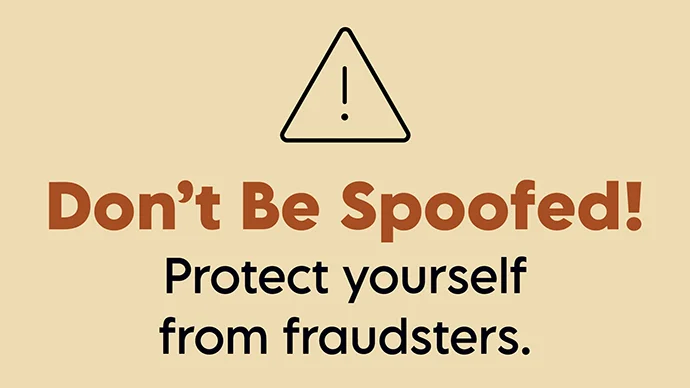
Scammers are becoming more sophisticated in their tactics to exploit people. From phishing schemes to investment frauds, it's hard to navigate the landscape of potential scams. Understanding the red flags and staying vigilant are crucial steps to safeguarding yourself from falling prey to scams in the digital age.
Phishing Scams
Phishing scams are fraudulent attempts to deceive people into revealing sensitive information. Phishing uses fake emails, messages, or websites that appear to be from trustworthy sources. Phishing scams use sophisticated tactics like creating convincing replicas of legitimate websites, exploiting fear or curiosity, and using deceptive urgency. These tactics can lead individuals to disclose sensitive information or click on malicious links without thinking it through.
You can significantly reduce the risk of falling victim to phishing scams by:
- Being skeptical of unexpected emails or messages
- Verifying the sender's authenticity
- Using multi-factor authentication
- Staying informed about common phishing tactics
Impersonation Scams
Impersonation scams involve scammers pretending to be someone else to deceive individuals for financial gain or personal information. Scammers pose as trusted entities and manipulate victims into divulging sensitive information or transferring funds. To avoid these deceptive tactics, verify the identity of anyone making unsolicited contact and refrain from sharing personal or financial details without thorough authentication.
One common impersonation scam is the scammer posing as the IRS, calling you, and demanding money. The IRS will never call to ask for payment. If you receive a call from someone claiming to be from the IRS, hang up immediately. The IRS will only contact you through mail or in-person interview.
Regarding debt collection, it's important to be cautious. You can research the collector and ask them to send a Debt Validation Letter to confirm the debt's validity.
Affinity Fraud
Affinity fraud is a scam in which a scammer takes advantage of the trust and shared interests within a specific group, such as a religious, ethnic, or social community, to carry out fraudulent schemes. The perpetrators of affinity fraud often gain credibility by being a part of or targeting a particular group, making it easier to manipulate the trust of individuals within that community. These schemes can involve investment fraud, pyramid schemes, or other financial scams that prey on group members' shared connections and trust.
Affinity fraud is particularly dangerous because victims are likely to let their guard down due to a sense of shared identity. Exercise caution and conduct thorough research before making financial decisions, even within seemingly trustworthy circles. The ultimate goal of the scammer is to sell something, persuade the victim to make a fraudulent or inappropriate investment, or deceive them into revealing sensitive information. The scammer may be an actual member of the group, even someone the victim knows or likes, or they may simply pretend to be an actual member.
Be careful when someone on the other end of the line requests money or information, regardless of their identity or claims. Suppose they claim to represent a group you support. In that case, it is advisable to use official channels such as their website to ensure your donation reaches the intended recipients and not a scammer.
Scams Targeting Seniors
Unfortunately, seniors are often the group targeted most aggressively by scammers. This means that they need to be extra cautious when answering the phone or browsing the internet and vigilant about keeping their information and money protected. One tactic that scammers can use is to claim to be or represent a loved one who’s in trouble and needs money for an emergency. Seniors and anyone else who receives a call or email like this should always confirm the legitimacy before doing anything.
Dealing with Scammer
When encountering a scammer, prioritize personal safety and immediately cease communication with the individual. Do not provide personal or financial information, such as passwords, credit card details, or Social Security numbers. Block the scammer's contact and report the incident to the appropriate authorities, such as the local police and relevant online platforms, if the scam occurred digitally. Additionally, notify your Blaze and other financial institutions if there is a risk of compromised financial information.
If you suspect you have sent money to a scammer, take immediate action. The first step is to cancel any card used and notify Blaze about the theft of your account information. If the scammer has access to sensitive information, like your Social Security number, the FTC website provides useful guidance on what steps you can take next. It is always better to act quickly and take necessary steps to safeguard your personal information to avoid potential harm.
Remember that law enforcement agencies and consumer protection organizations are valuable resources for investigating and addressing fraudulent activities. Scammers always evolve and improve tactics to exploit unsuspecting individuals. To stay protected and informed, visit the Federal Trade Commission's Federal Trade Commission's website. There, you can access information about recent scams, as well as helpful tips on how to keep yourself safe.
Related Articles

Protecting Your Online Accounts: Password Safety Tips
Your passwords are the digital keys to your personal and professional life—just like the keys to your home, they must be kept secure.

Protect Yourself from Cryptocurrency Scams
Cryptocurrency scams have become increasingly prevalent. Learn how to protect yourself against them with these common warning signs.

Don't Be Spoofed
Fraudsters are hard at work trying to steal your account and personal information. There are ways to protect yourself from these thieves.